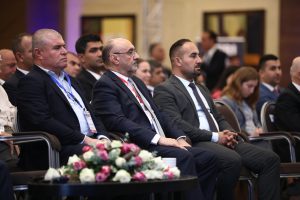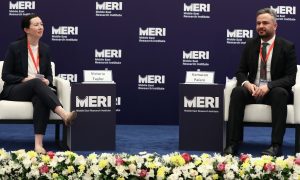The US Foreign Policy in Iraq and the Middle East
In this session, the US policy in Iraq with a particular focus on the Kurdistan Region was discussed with Victoria Taylor, the US Deputy Assistant Secretary (DAS) for Iran and Iraq in the Bureau of Near Eastern Affairs at the US State Department.
- Ms. Victoria Taylor, Deputy Assistant Secretary for Iran and Iraq in the Bureau of Near Eastern Affairs at the US State Department
- Dr. Kamaran Palani, Research Fellow at MERI
The US in the Middle East
Has the US abandoned the Middle East? Is the Middle East still a focus of the US foreign policy? These are key opening questions put to DAS Taylor, to which she responded and emphasized that the US remains intensely engaged in the region. She highlighted key components of the US engagement efforts in the region and stated that “The Biden Administration has been particularly focused on efforts to resolve conflicts looking at how we can promote elections in Libya, how we can resolve the conflict in Yemen and also working to promote Regional integration” She elaborated to the US Administration’s continuous efforts to deescalate tensions, and maintain a strong presence in the Middle East and thought that “the Abraham Accords and the efforts to promote normalization between many countries in the Middle East and Israel has been a key part of this, but we [the US] remain intensely engaged in those efforts, and I think the tragic events in Israel [and] the attack in Israel is just another reminder of how important it is for the United States to remain engaged in the Middle East.”

The US-Iraq Partnership:
On the US-Iraq partnership, DAS Taylor stressed the importance of a strong and resilient Iraq and stated that “the US remains intensely focused on Iraq. Iraq is really a cornerstone to stability in the Middle East and we believe that this longstanding strategic partnership is really critical to our interests and to Iraqi interests as well, and so we are focused on really building on what has always been a very strong security partnership and looking at how we can build this 360 degree partnership that includes greater cooperation on economic issues, on energy issues, greater exchange between our peoples and also I think looking at new opportunities to cooperate on issues involving the climate and water.”
DAS Taylor highlighted shared goals with Prime Minister Al-Sudani, and said: “there are a lot of shared goals that we can continue to work on. We recently had a meeting between the Secretary of State and Prime Minister Sudani in New York on the margins of the UN General Assembly and I think it really showcased the breadth of the relationship and the ways that we can continue to partner with his government. Al-Sudani has really focused on encouraging increased our investment and economic ties between our two countries.” She later underlined the importance of resolving outstanding issues, such as the budget and hydrocarbons law.
Iraq’s Internal Challenges: IDPs and the Youth
On Iraq’s ability to address challenges faced by different segments of the population, DAS Taylor acknowledged the importance of supporting the Yezidis and the internally displaced persons (IDPs), focusing on stable housing solutions and livelihoods in Iraq. As for the youth, she referred to her meeting with a group of students recently where they were focusing on pressing issues in Iraq, including health care system, education, climate and water in Iraq. She thought the Iraqi government should focus on its youth by meeting their needs, saying that “it’s also critical for the United States to think about how we can continue to build a relationship with the Iraqi youth, …… part of our engagement is focused on the educational sector, …… We look at ways that we can continue to bring young people to the United States to give them opportunity to really learn about the US and our culture.”

The US Support for Iraqi Kurdistan Region
In response to concerns about the US visibility and support for the Kurdistan Region of Iraq (KRI), DAS Taylor reiterated the US’s strong support for a resilient KRI within Federal Iraq and clearly stated that “We’re still here, we still care and we’re still engaged, and I know there’s a perception that the US doesn’t care about the Middle East anymore … the Middle East is still critical to us interests we are still actively engaged and we’re going to remain engaged…. whether that’s engaging in Baghdad and engaging in Erbil, a strong stable secure Iraq is in the US interests and ensuring a strong and resilient KRI is very clearly in our interest as well.”
DAS Taylor encouraged unity within the Kurdistan Regional Government (KRG) for effective negotiations with Baghdad and emphasized ongoing security cooperation, including support for the Peshmerga forces. She also stressed the need for continued engagement with both the KRG and Baghdad on the future of the Disputed Territories, efforts to combat ISIS, strengthen security forces, and address outstanding issues were highlighted as crucial for ensuring greater stability. She said:“we think the more the KRG and Baghdad continue to work jointly, this is important towards ensuring greater stability and addressing many security issues.”
The conversation extended to challenges Iraq and the KRI face from neighboring countries, such as Turkey and Iran. DAS Taylor emphasized the US commitment to Iraq’s sovereignty and encouraged direct engagement with these countries to address complex challenges.
Addressing Regional Challenges
In concluding the session, DAS Taylor reiterated the unwavering support of the United States for the KRI by saying that “there is no greater supporter and no bigger champion for the Iraqi Kurdistan Region than the United States and we’re still here, we’re going to remain engaged, and we look forward to continuing our efforts to expand our partnership.”
MERI Forum 2023
Addressing Iraq’s Immediate Priorities
10 & 11 October, 2023
Session 10: US Policy in Iraq and its Neighbourhood
Session Video

